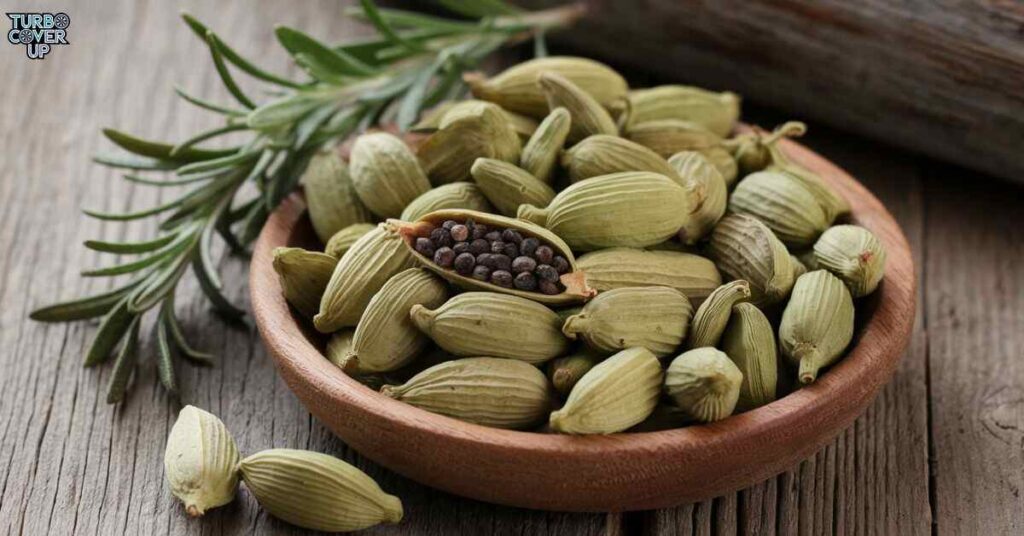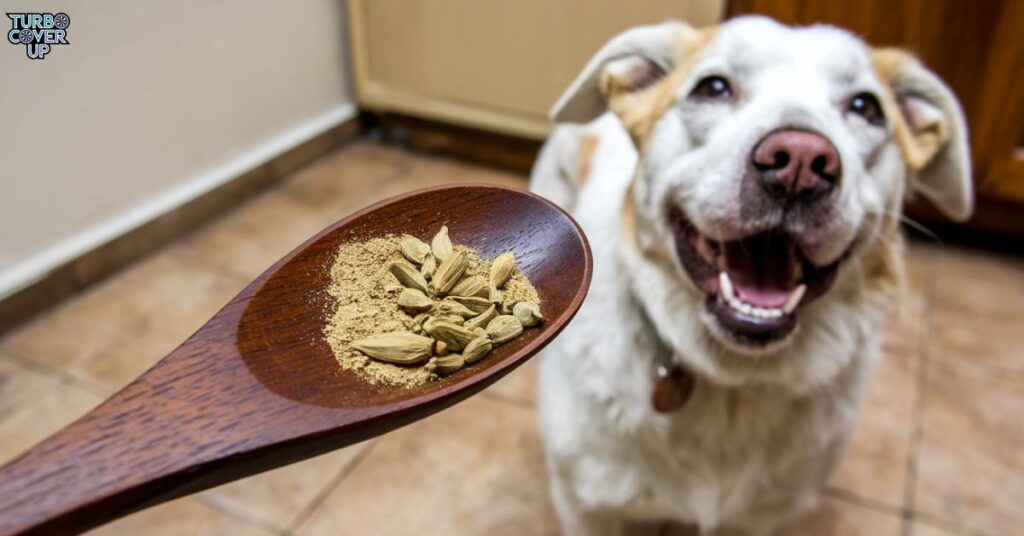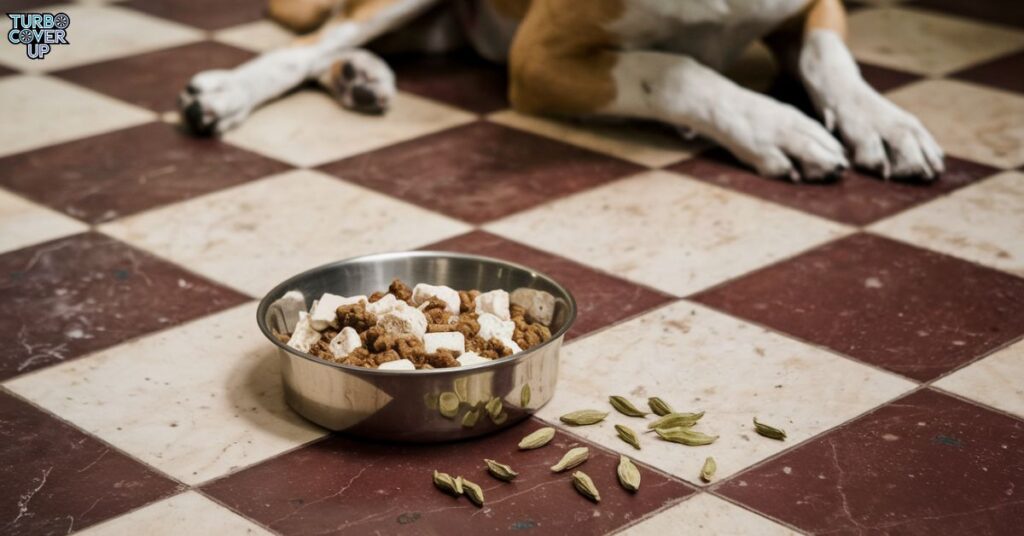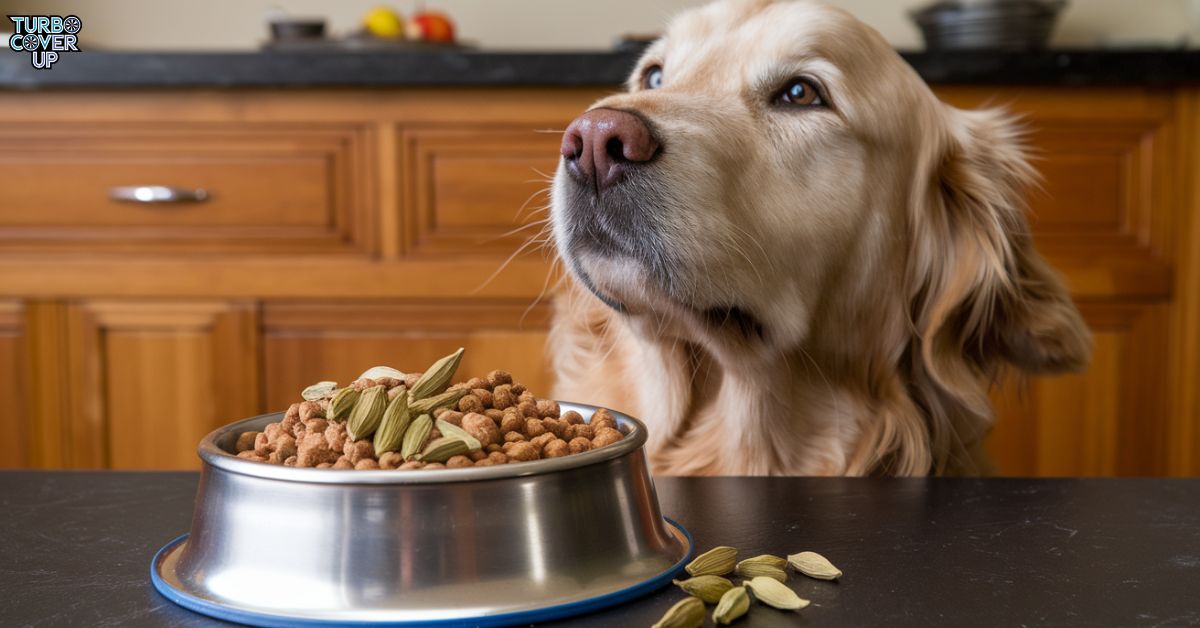Can Dogs Eat Cardamom? Many dog owners wonder if it’s safe to share this fragrant spice with their furry friends. Cardamom is a popular ingredient in various dishes, but not all spices are suitable for dogs. So, is it safe for your pup?
While cardamom is generally considered non-toxic for dogs, it’s important to feed it in moderation. Some dogs may benefit from its digestive and antioxidant properties but always check with your vet before adding it to their diet.
In this article, we’ll discuss the potential benefits and risks of cardamom for dogs!
What Is Cardamom?

Cardamom is a culinary spice that’s been spicing up kitchens for centuries. It’s part of the ginger family and comes in two main types: green cardamom (Elettaria cardamomum) and black cardamom (Amomum subulatum).
This aromatic gem is often found in Indian cuisine and Middle Eastern spice blends. Its distinct aroma and aromatic flavor make it a favorite in savory dishes and sweet treats.
But cardamom isn’t just about taste. It’s been used in traditional medicine for ages, boasting potential health benefits that have piqued the interest of both humans and pet owners alike.
Read more: Can Dogs Eat Orange Chicken?
Is Cardamom Healthy For Dogs?

When it comes to pet nutrition, cardamom might have some perks for our furry friends. It’s packed with antioxidants that could boost your pup’s immune system.
Cardamom also contains essential minerals like potassium and calcium. These nutrients play key roles in keeping your dog’s body functioning smoothly.
Cardamom might help with digestive health too. It could ease indigestion, constipation, and even loose bowels. However, remember that every dog is different, and what works for one might not work for another.
Is Cardamom Safe for Dogs?
Cardamom is generally considered non-toxic to dogs. This means you don’t need to panic if your pup sneaks a lick of your cardamom-spiced chai.
However, like all good things, moderation is key. While cardamom isn’t toxic, too much of it could upset your dog’s tummy. It’s always best to introduce new foods slowly and in limited quantities.
Before you start sprinkling cardamom on Fido’s kibble, it’s important to get veterinary guidance. Your vet knows your dog’s dietary needs best and can advise on whether cardamom is a good addition to their diet.
Read more: Can Dogs Eat Farro?
Should You Feed Cardamom to Your Dog?
Deciding whether to feed cardamom to your dog is not a simple yes or no question. It depends on various factors, including your dog’s overall health, age, and individual needs.
Cardamom does offer some potential benefits. Its anti-inflammatory properties help dogs with conditions like arthritis. Its anti-microbial effects could support overall health.
However, it’s not a necessity in your dog’s diet. Dogs can get all the nutrients they need from a balanced, vet-approved diet. If you’re considering adding cardamom, it’s best to do so as an occasional treat rather than a dietary staple.
Nutritional Content of Feeding Cardamom to Your Dog
Cardamom is low in calories but rich in nutrients. It contains vitamins like B6 and C and minerals such as manganese and iron. These can contribute to your dog’s overall health when given in the right amounts.
However, keep in mind that dogs have different nutritional needs than humans. While cardamom can be a healthy addition, it shouldn’t replace any part of your dog’s regular, balanced diet.
Benefits of Feeding Cardamom to Your Dog
Feeding cardamom to your dog in moderation may offer several health benefits. This spice contains anti-inflammatory and anti-microbial properties that can help support your dog’s overall health. It can soothe an upset stomach, reduce gas, and improve digestion.
Cardamom may also help dogs with arthritis or other inflammatory disorders by reducing inflammation and providing some relief from discomfort. Its natural compounds have been used traditionally to ease digestive issues in both humans and animals. Incorporating it into your dog’s diet occasionally could help improve their gut health.
In addition to digestive benefits, cardamom can combat bacterial and fungal infections. The spice’s antimicrobial properties may protect against certain infection, supporting your dog’s immune system. However, it’s important to introduce it gradually and consult your vet beforehand.
Read more: Can Dogs Eat Scooby Snacks?
How Should You Feed Cardamom to Your Dog?

If you’ve decided to introduce cardamom to your dog’s diet, start small. A pinch of ground cardamom mixed into their regular food is a good way to begin.
Always use pure, unsweetened cardamom. Avoid any blends that might contain other spices or additives that could be harmful to dogs.
Monitor your dog closely after introducing cardamom. If you notice any changes in their behavior or digestion, stop feeding it and consult your veterinarian.
Are There Risks of Feeding Your Dog Cardamom?
While cardamom is generally safe, it’s not without risks. Some dogs might be allergic to spices, including cardamom. Watch for signs of allergic reactions like itching, swelling, or difficulty breathing.
Cardamom can have a laxative effect if consumed in large quantities. This could lead to gastrointestinal issues like diarrhea or vomiting.
Lastly, remember that not all spices are safe for dogs. While cardamom is okay, others like garlic and onion are toxic. Always research or consult your vet before introducing new foods to your dog’s diet.
Why Is Cardamom Dangerous for Pregnant Dogs?
Pregnant dogs need special care, and that includes being cautious about their diet. Cardamom, despite its benefits, is not recommended for pregnant dogs.
The compounds in cardamom that give it its health-promoting properties can also stimulate the uterus. This stimulation could potentially lead to complications or even miscarriages in pregnant dogs.
It’s always better to err on caution with pregnant pets. Stick to a vet-approved diet specifically designed for pregnant dogs to ensure both mom and pups stay healthy.
Read more: Can Dogs Eat Tajin?
What Should I Do If My Dog Ate a Lot of Cardamom?

If your dog has eaten up more cardamom than they should, don’t panic. In most cases, they’ll be fine. However, it’s important to keep an eye on them.
Watch for signs of digestive upset like vomiting or diarrhea. If these symptoms persist or if your dog shows signs of distress, it’s time to call the vet.
Remember, it’s always better to be safe than sorry. If you’re worried about the amount of cardamom your dog has eaten, don’t hesitate to seek veterinary guidance.
What Other Spices Are Safe and Healthy for Dogs?
While cardamom can be a nice treat, there are other safe spices that can add flavor and potential health benefits to your dog’s diet. Here’s a quick other safe spices countdown:
- Turmeric: Known for its anti-inflammatory properties
- Cinnamon: May help regulate blood sugar
- Ginger: Can aid digestion and reduce nausea
- Parsley: Freshens breath and supports urinary health
Final Thoughts
Cardamom can be a safe and potentially beneficial addition to your dog’s diet when used correctly. Its aromatic flavor and potential health benefits make it an interesting option for pet owners looking to spice up their dog’s menu.
Always consult your veterinarian before making significant changes to your dog’s diet. Ultimately, the most important thing is to ensure your dog has a balanced, nutritious diet that meets their specific needs.
Frequently Asked Questions
Can dogs eat cardamom?
Yes, dogs can eat cardamom, but it should only be given in small amounts.
Is cardamom safe for dogs?
Cardamom may help with digestion and has antioxidants, but it’s not essential for their diet.
Can cardamom be harmful to dogs?
Too much cardamom can upset your dog’s stomach, so moderation is key.
Is cardamom safe for pregnant dogs?
No, it’s best to avoid cardamom for pregnant dogs as it may cause complications.
How should I give cardamom to my dog?
Start with a small pinch mixed into their regular food and watch for any reactions.
Read more: Can dogs eat spinach?

